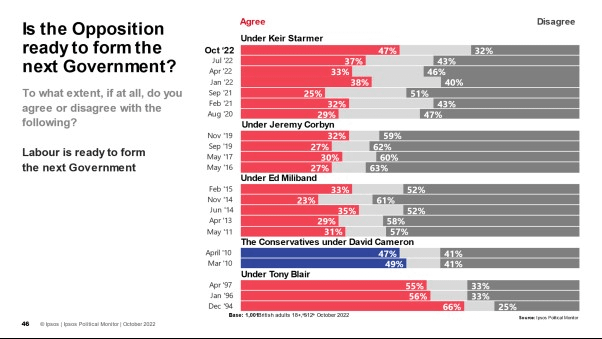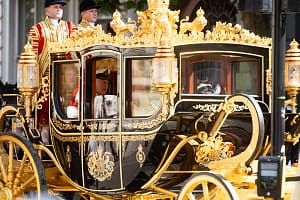The latest Ipsos Political Monitor, taken 5-12 October, shows Labour taking the lead as the party with the best policies for managing the economy for the first time since September 2007.
Labour also leads on a range of other policy areas, such as reducing the cost of living, taxation, poverty and inequality, healthcare, benefits and pensions, and housing, while Conservatives are seen as the party with the best policies only on defence.
The Conservatives also fall to some of their lowest scores since 2011 on image ratings such as being fit to govern, understanding Britain’s problems, and looking after people’s interests, whilst Labour receives its highest score on readiness to form the next government since entering into Opposition.
Party with best policies
- Labour are seen as the party with the best policies on managing the economy by 34% (up 8 points since April), while the Conservatives are picked by 21% (down 11). This is Labour’s first lead on this issue since September 2007.

- Labour also lead on other economic policies such as reducing the cost of living (by 40% to 14%), taxation (by 39% to 20%, their biggest lead since 1995), poverty and inequality (by 48% to 9%, biggest lead since started recording this in 2015), benefits (by 49% to 13%, biggest lead since 2010), pensions (by 32% to 18%, biggest lead since 2002),and unemployment (by 38% to 23%, similar to the lead last year)[1].
- On public services, Labour leads by 47% to 13% on healthcare (its biggest lead since 1999), education by 33% to 22% (biggest lead since 2012), crime and anti-social behaviour by 26% to 21% (Labour’s first lead since 2005), housing by 40% to 12% (its biggest lead since 1998), and asylum and immigration by 26% to 18% (similar to its lead in April this year, but before that the highest Labour lead since 2005).
- Of the policy issues asked about, the Conservatives only lead on defence, by 34% to 18%, although their lead has halved since December 2019.
- The two parties are relatively close on handling Britain’s future relationship with the EU, at 27% Labour vs 24% Conservatives, while both parties are behind the Greens on the environment (Labour 17%, Conservatives 12%, Greens 28%).

Party image ratings
- On detailed party image ratings, Labour are ahead of the Conservatives on all positive metrics asked about. Their biggest leads are on being concerned about the people in real need in Britain (50% for Labour vs. 13% for the Conservatives), understanding the problems facing Britain (46% vs. 22%), looking after the interests of people like me (37% vs. 14%), having a good team of leaders (30% vs. 11%), being fit to govern (35% vs. 16%) and keeping its promises (22% vs. 10%).
- Each of these scores are the lowest the Conservative party have scored over the past eleven years (or last 7 years for concerned about people in real need).

- Meanwhile, the Conservatives are more likely than Labour to be perceived as willing to promise anything to win votes (65% for Conservatives vs. 51% for Labour), extreme (33% vs. 12%), out of date (52% vs. 30%) and divided (64% vs. 36%).
- Nearing half (47%) agree that Labour is ready to form the next government (+10 since July 2022), while one in three disagree (32%, -11). This is the highest level of agreement since Labour went into opposition (previous high was 38% in January 2022). Their numbers are comparable to those achieved by the Conservatives under David Cameron in April 2010 when 47% agreed the Conservative were ready and 41% disagreed – but behind slightly Tony Blair’s Labour in 1997 when 55% agreed, 33% disagreed.
- Only one in five (22%) agree that the Conservative government deserves to be re-elected (-9 since July 2022), whilst three in five disagree (60%, +8).
 Gideon Skinner, Head of Political Research at Ipsos, said, “Over the last couple of years, the public’s image of the Conservative party has been in steady decline – particularly on issues of governing competence and empathy – and this has continued under the new Prime Minister.
Gideon Skinner, Head of Political Research at Ipsos, said, “Over the last couple of years, the public’s image of the Conservative party has been in steady decline – particularly on issues of governing competence and empathy – and this has continued under the new Prime Minister.
“Now however it is compounded by the party also falling behind Labour when the public rates who has the best policies on their top two priorities: the cost of living crisis and the economy (where Labour have their first lead for 15 years).
Meanwhile, though on some detailed image scores the story is more about Conservative weaknesses than Labour improvements, the other notable piece of good news for Keir Starmer is the clear rise in those who think Labour are ready to form the next government, to their best score since they went into opposition.”






Leave a Comment